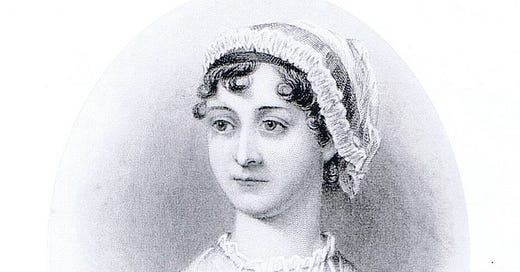This year it’s the 250th anniversary of Jane Austen’s birth. Born on the 16th December in 1775, her novels have barely, if ever, been out of print. Die-hard Jane Austen fans are ready to enjoy what will be a year jam-packed with events and lectures, TV adaptations and examinations of her six glorious novels. I too will be re-reading all six novels this year, and trying to work out what it is that has me coming back for more, because more is what you get with every re-read.
Like many, I read my first Jane Austen novel as a teenager at school: Mansfield Park, brilliantly taught my English teacher, Mrs Blaine. Mansfield Park is a tough introduction to Jane Austen. Her wit is there and the thorny social situations, the pulling rank, the slights and the simple kindnesses, but the main character, Fanny Price, does not have the instant appeal or frothy personality of an Elizabeth Bennet.
Fanny is difficult to understand, infuriating in her passivity, and for a 20th century audience, which is what I was back then, Fanny’s morals and sense of propriety were not relatable. They still aren’t today. Yet somehow, thanks to Mrs Blaine’s guidance, we all came to understand Fanny.
But what is it about Jane Austen that compels me to carry on reading her now? I’ve read most of her novels not once or twice, but multiple times.
Well, it could be the stories themselves. All are love stories, and a good love story brilliantly told with plenty of twists and turns and reversasl of fortune, is hard to beat.
It could be the characters, who despite the distance of a couple of hundred years remain relatable and recognisable, because the fears and concerns in their daily lives, the petty stresses of family life haven’t really changed for most. Everyone has an annoying uncle or cousin or two. Everyone is obliged to be nice to those with power and more money just to survive.
Austen specialises in skewering the self-important, the obsessively fashionable, the narcissistic. While others fawn and elevate the pushy extroverts into classic heroes and heroines, who dominate social situations, crowding out the introverted, quieter people, Austen takes them apart. This is what I adored about Mansfield Park. This is what had me completely hooked. She sees what’s going on, she explains it to you. Through Fanny Price she gave me a handbook explaining how to stick to your guns.
And then there’s the language. The beautiful poise of her English sentences. The way her words create a different landscape in the mind. Some of the vocabulary she uses, and the syntax, are nearly alien to us two hundred and fifty years later. However, for me, that’s part of the joy of reading an Austen novel; it expands my brain and reacquaints me with an entirely different mindset, one we’ve lost to the short attention-span text-speak that has reduced so many to communicating with fragmentary basics. Her language is detailed and nuanced, her with sparkles and re-reading her endlessly offers new bright capsules of understanding, a deeper knowledge of the world and the people in it.
When reading her six superb novels, the search for Jane herself inevitably begins.
Who was she?
Would I have liked her?
Which of the characters she created is the closet rendition of herself?
I don’t think Jane set out to write herself as one complete character in any of the novels. I think her quest was one of understanding. She wanted to explore different personalities and examine how they might operate within the same circumstances: the conundrum of the Georgian marriage market.
Women in Jane Austen’s day had few options available other than marriage, or spinsterhood on a private income, if they had one. Or if their families allowed, and circumstances demanded, life as a governess or companion to someone elderly and wealthy might be an option. However, marrying for love could nearly never be a first consideration. Financial security was the top priority, even if it was modest to middling, with the great prize of high luxury and substantial wealth, being the ultimate dream. Jane Austen wrote about money, power and the status it carried, as well as love, wherever it could be found.
I hope you’ll join me on my journey into Austenland, her novels, her language, her daily life and her journey to publication which was far from easy or direct. What a surprise! Nothing’s changed there either. I’ll be posting up what I discover re-reading her novels this year, and as a writer, I’ll examine what can be learned from her virtuosity.
First up, will be Northanger Abbey.
© Annette Gordon







I look forward to reading your rereadings. I love Mansfield Park, and it is probably my favourite, though it was the last of her novels that I read. Reading her again later in life, I appreciate Jane Austen now far more than I did when reading her at A level!
Loved this! And look forward to celebrating an Austentastic year reading your newsletter . Really rare to start with MP and to have found your way to loving it. I will eagerly anticipate your thoughts on that one.